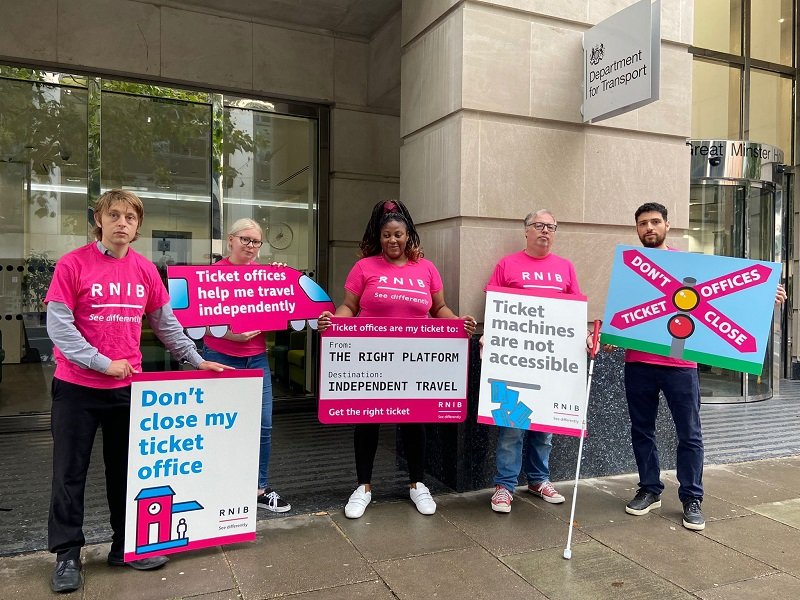RNIB demands scrapping of train ticket office closure plans
Today, the Royal National Institute of Blind People (RNIB) staff and volunteers gathered outside the Department for Transport on behalf of thousands of blind and partially sighted people, who have expressed their deep opposition to plans to close rail ticket offices.

In July, the Rail Delivery Group announced a consultation, ending today, on planned mass closure of rail ticket offices in England and Glasgow Central.
Vivienne Francis, RNIB Chief Social Change Officer, said:
“The overwhelming view from the majority of blind and partially sighted people is that closing ticket offices would put the brakes on people travelling, be it to get to work or to see their team play or just to meet friends. RNIB is standing behind this groundswell of opinion and vehemently opposes these proposed changes, which could lead to most ticket offices closing in England, as well as Glasgow Central.
“Closing rail ticket offices would have a severe impact on blind and partially sighted people’s ability to purchase tickets, arrange assistance, and travel by rail – and exacerbate the barriers that already exist to independent travel.
“This consultation – reported to have received a remarkable number of 460,000 responses, despite the complexity of engaging with it – closes today, but our campaigning won't stop.
“While we wait for the next steps on the consultation, expected in October, RNIB will keep continue speaking out to government and suggesting solutions. Although to some sighted customers, physical ticket offices could belong in the past, we need to challenge assumptions that everyone can use touchscreens and apps. As far as we are concerned, modernisation of the railways shouldn’t mean leaving anyone behind and inclusivity for all should be at the heart of any changes.”
RNIB research found that only 3 per cent of blind and partially sighted respondents said they could use a ticket vending machine without problems, with 58 per cent said it was impossible, and 76 per cent saying they would prefer to buy tickets from a person at a ticket office. 88 per cent of blind and partially sighted respondents said it was important to have a fixed location at which to find staff.
RNIB research also highlighted accessibility problems with online ticket websites and apps, which immediately exclude many blind and partially sighted people when using smartphones.
With the number of people with sight loss increasing and by 2050 it will double to over four million people, RNIB is calling for all transport providers to work with the charity to create a transport infrastructure that works better for everyone, and that includes keeping ticket offices open.
Notes to editors
For media enquiries contact RNIB press office on 0207 391 2223 or [email protected]. For urgent enquiries out-of-hours, please call 07968 482812.
About RNIB
We are the Royal National Institute of Blind People (RNIB).
Every six minutes, someone in the UK begins to lose their sight. RNIB is taking a stand against exclusion, inequality and isolation to create a world without barriers where people with sight loss can lead full lives. A different world where society values blind and partially sighted people not for the disabilities they’ve overcome, but for the people they are.
RNIB. See differently. Call the RNIB Helpline on 0303 123 9999 or visit www.rnib.org.uk







